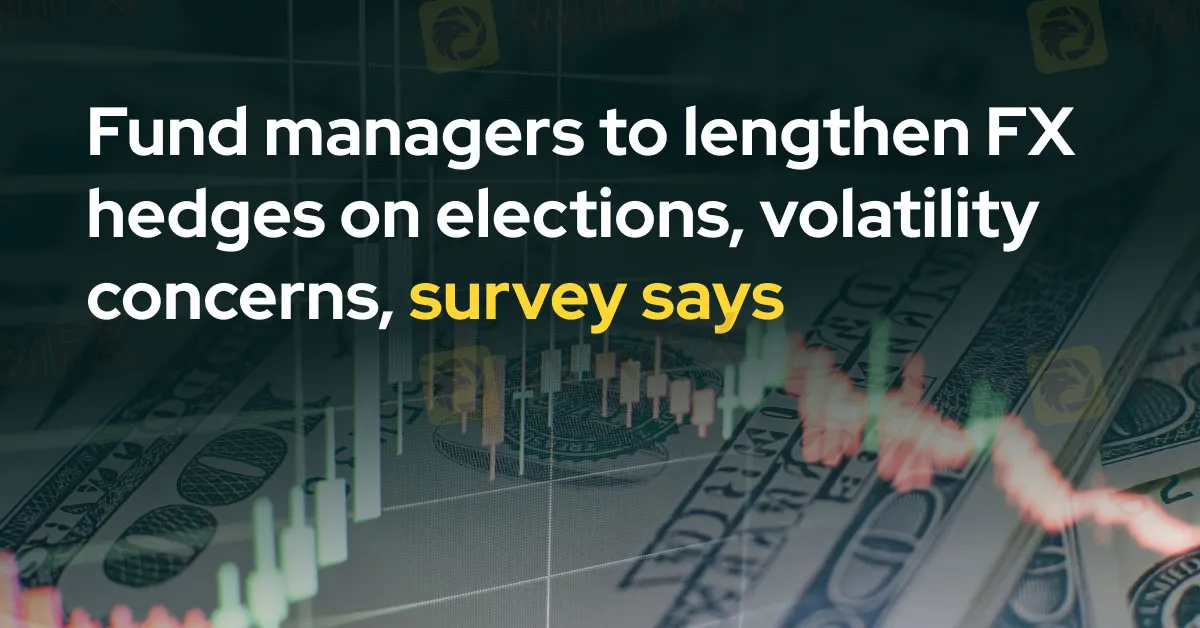简体中文
繁體中文
English
Pусский
日本語
ภาษาไทย
Tiếng Việt
Bahasa Indonesia
Español
हिन्दी
Filippiiniläinen
Français
Deutsch
Português
Türkçe
한국어
العربية
Fund managers to lengthen FX hedges on elections, volatility concerns, survey says
Abstract:Fund managers are looking to hedge more of their foreign exchange risk for longer to protect their returns, as concerns about volatility and the potential for unpredictable movements resulting from the upcoming U.S. elections grow.

Fund managers are looking to hedge more of their foreign exchange risk for longer to protect their returns, as concerns about volatility and the potential for unpredictable movements resulting from the upcoming U.S. elections grow.
Softer-than-expected U.S. jobs data last week, coupled with disappointing earnings from major tech firms, triggered a global sell-off in stocks and high-yielding currencies, with the greenback falling about 6% against the yen over the last five trading days.
A survey released on Wednesday found an increasing number of North American fund managers are planning to raise the tenor and the size of their hedges to shelter more of their currency exposures from losses and add more certainty to their portfolios.
The survey of 250 senior finance decision makers conducted by MillTechFX, the multi-dealer currency platform arm of specialist currency manager Millennium Global, found 65% of managers plan to lengthen the time in which they are shielded from FX volatility by moving to secure favorable exchange rates for their future transactions.
Meanwhile, 34% of managers expect to up their hedge ratios, a move that guards a greater portion of their exposures and portfolios from volatility.
“It's clear that fund managers are concerned about the potential FX ramifications, with many adopting a more proactive approach, protecting more of their currency exposures for longer as they seek to secure certainty in a climate that is anything but certain,” said Eric Huttman, chief executive officer at MillTechFX.
Managers can use long-term derivatives contracts such as FX forwards or options to secure favorable rates at which they prefer to trade in the future.
Geopolitics and diverging monetary policies between the U.S. and other central banks have been influencing investors' hedging activities this year.
Some 93% of managers have expressed concerns about dollar strength, with the survey finding that more than 80% of them saw their returns affected by dollar strength this year.
As a result, the number of managers hedging their forecastable currency risk rose to 79% this year, up 7 percentage points from 2023, according to the survey.
The dollar is currently up 1.6% against a basket of its major peers, shedding some of its gains, in part, over recession fears and the timing of interest rate cuts.

Disclaimer:
The views in this article only represent the author's personal views, and do not constitute investment advice on this platform. This platform does not guarantee the accuracy, completeness and timeliness of the information in the article, and will not be liable for any loss caused by the use of or reliance on the information in the article.
Read more

Why Your Stop Loss Keeps Getting Hit & How to Fix It
Many new traders run into the same frustrating problem. They analyse the market, place a trade, and watch the price go against them just enough to hit their stop loss. Then, like a bad joke, the price moves exactly in their predicted direction. Read this article to learn how to fix this issue for good!

Safe-Haven Surge: Gold Shines Amid Market Turmoil
Rising geopolitical tensions fuel a flight to safety, propelling gold past key resistance and positioning it as a top-performing asset in today’s volatile market.

Forex Trading Challenges in India
Explore this guide to understand the challenges that deter India's forex market from unleashing its true potential.

The Deepening Roots of Forex Scams in India
Check out how forex scams in India have expanded beyond banks and unregistered brokers to include the informal gang racket duping investors every day.
WikiFX Broker
Latest News
Safe-Haven Surge: Gold Shines Amid Market Turmoil
Why Your Stop Loss Keeps Getting Hit & How to Fix It
Indian "Finfluencer" Asmita Patel Banned: SEBI Slaps Charges on Her Company, AGSTPL
HDFC Bank's Green Push: Empowering 1,000 Villages with Solar Energy
MetaQuotes Rolls Out MT5 Build 5120 with Enhanced Features and Stability Fixes
Boosted by U.S. CPI, Yen May Rise Again
Global oil prices soar after Israel attacks Iran
Advantages of Using EA VPS for Trading - Detailed Guide
$1.1 Million Default Judgement Passed Against Keith Crews in Stemy Coin Fraud Scheme
U.S. consumer prices rose 2.4% in May, below expectations
Currency Calculator


